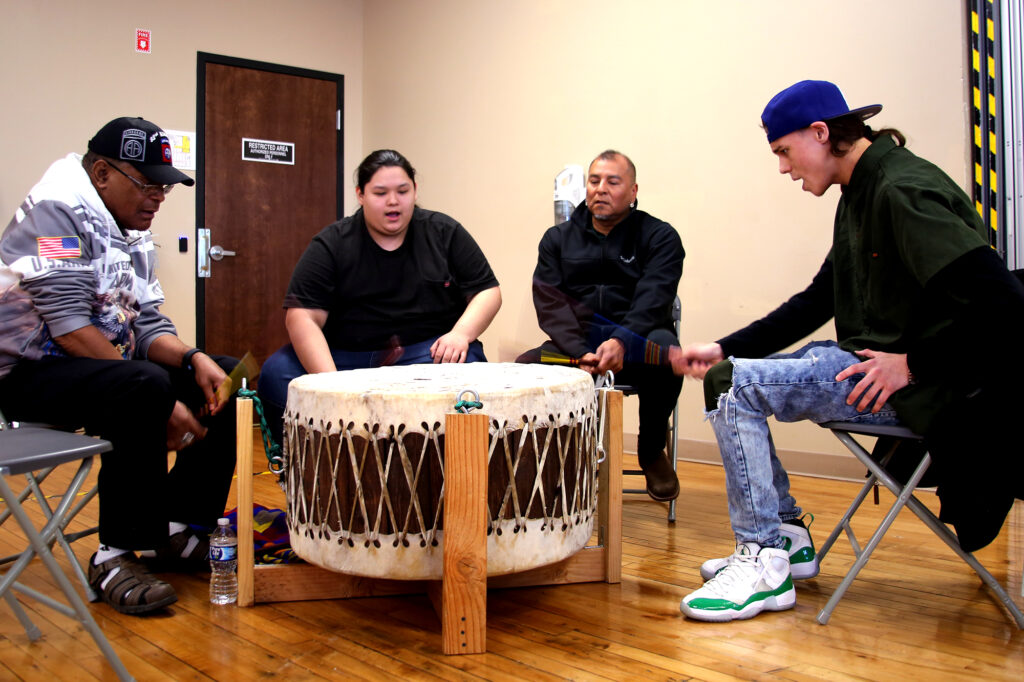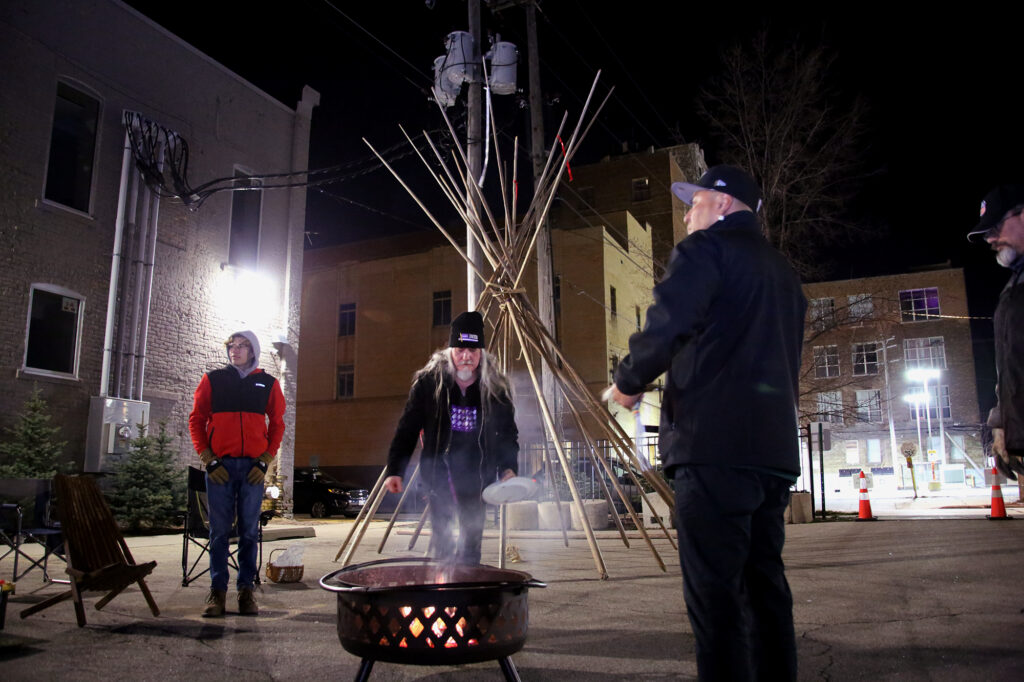Milwaukee’s Native Community Faces Surge in Opioid Deaths
Battling the highest overdose rate among all racial and ethnic groups.

A group of drummers and singers play music at an opioid grief vigil to honor those who have died of opioid overdoses. The vigil was held in April at the Gerald L. Ignace Indian Health Center, 930 W. Historic Mitchell St. (Photo provided by the Gerald L. Ignace Indian Health Center)
Sisters Alyssa Cook and Lena lost their mother to an opioid overdose in September 2023.
Lena, who wishes to remain anonymous because she works in health care, reflected on the lack of options available to her mom and the time and money it would have taken for her to go to rehab.
“Who was going to pay rent if she didn’t work? Who was going to watch the kids?” she asked.
The sisters are not alone. Local health care advocates warn of a growing opioid crisis disproportionately impacting Indigenous communities in Milwaukee and across the state.
A lifeline for those fighting addiction
The Gerald L. Ignace Indian Health Center, located at 930 W. Historic Mitchell St., hopes to serve as a beacon for those struggling with addiction in Milwaukee.
For many Native Americans in Milwaukee, addiction is intertwined with historical trauma, systemic issues and deep personal pain, research shows.
Cook and her sister became familiar with grief at a young age, as substance abuse was common within their family and Native communities.
Cook is from the Red Lake Tribe of Ojibwe and Lena is from the White Earth Band of Ojibwe.
Addiction hits Native community hardest
In 2021, Native Americans suffered 56.6 overdose deaths per 100,000 people, the highest among all racial or ethnic groups, as reported by the Centers for Disease Control and Prevention,
“Here in Milwaukee, the Native population has the highest overdoses compared to all other populations. This is an epidemic,” said Lyle Ignace, a physician who is the CEO of the Gerald L. Ignace Indian Health Center.
“There is a strong spiritual, emotional and mental health element rooted in the daily struggle of our community,” he said.
According to Milwaukee County’s overdose data, Native Americans had the highest fatal overdose rate at 295 per 100,000 people in 2022, more than double that of the next highest group: Black Milwaukeeans.
Generations of hardships
Shortly before Cook’s and Lena’s mother’s death, their younger brother, Jerell, died of an opioid overdose. And one of their youngest cousins died from a fentanyl overdose two years ago.
“We lack the things we need to make a better life,” Lena said.
“We were all so disconnected,” Cook said. “It can feel so lonely.”
Forced separation from parents and family disproportionately affected Native families in the U.S. for decades, with many children being sent to boarding schools and white homes that required them to assimilate to white American culture, as documented by the Wisconsin Department of Children and Families.
Cook said she and Lena’s grandparents and most of their siblings were put up for adoption by child welfare agencies, reconnecting only as adults.
Lena believes these practices prevented her mother from overcoming drug use despite her best efforts.
Hope for the Native community
The Gerald L. Ignace Indian Health Center hopes to change those narratives of stigma and isolation in Milwaukee’s Native community.
The center incorporates traditional healing methods including powwows, drum circles and sweat lodges into treatment.

Community members participate in a ceremony to honor those who have died of opioid overdoses. The ceremony was held in April at the Gerald L. Ignace Indian Health Center, 930 W. Historic Mitchell St. (Photo provided by the Gabriel L. Ignace Indian Health Center)
For example, the health center held a grief vigil in April to honor those in the community who have died from an opioid overdose.
“Community-based care is so important,” said Ellicia Wilder, a counselor at the health center.
Studies indicate that cultural identity and spirituality play crucial roles for Native Americans seeking assistance for substance abuse.
Wilder believes events like the center’s recent opioid grief vigil can open the door for people to speak openly about addiction while also taking part in traditional ceremonies.
Gerald L. Ignace Indian Health Center has numerous services, ranging from behavioral health and outpatient therapy to its Keepers of Tradition Culture Program.
“We’re here to make a connection,” said Ignace, the health center’s CEO. “We want to help heal people, not just by talking about drug use, but in a way that connects them to their culture.”
Drug treatment services in the Milwaukee area:
First Step Community Recovery Center, 2835 N. 32nd St., 414-930-4529.
Gateway to Change, 2319 W. Capitol Dr., 414-442-2033.
10th Street Comprehensive Treatment Center, 4800 S. 10th St., 855-801-3867.
Rogers Behavioral Health, 414-865-2500.
Community Access to Recovery Services, or CARS: 1220 W. Vilet St., 414-289-6085.
Meta House, 2625 N. Weil St., 414-962-1200.
Community Medical Services, 2814 S. 108th St., 414-885-3525.
United Community Center, 1028 S. 9th St., 414-384-3100.
Visit Addictions.com’s Milwaukee resource page to find more alcohol and drug rehab centers in Milwaukee that feature free treatment and detox centers.
How Milwaukee’s Native community is fighting a surge in opioid deaths was originally published by the Milwaukee Neighborhood News Service.
If you think stories like this are important, become a member of Urban Milwaukee and help support real, independent journalism. Plus you get some cool added benefits.
More about the Opioid Crisis
- Milwaukee County Executive David Crowley Announces Over $9 Million for Initiatives to Combat Opioid Epidemic - County Executive David Crowley - Jul 17th, 2025
- AG Kaul, 45 Other Attorneys General Plan to Join $720 Million Settlement with Eight Opioid Drug Makers - Wisconsin Department of Justice - Jul 14th, 2025
- Attorney General Kaul Announces Consent Judgment with Kroger Over Opioid Crisis - Wisconsin Department of Justice - Mar 21st, 2025
- Baldwin Votes to Strengthen Penalties, Step Up Enforcement Around Deadly Fentanyl - U.S. Sen. Tammy Baldwin - Mar 17th, 2025
- Wisconsin Communities Get Millions From Opioid Settlement as Deaths Decline - Evan Casey - Mar 1st, 2025
- MKE County: County Creates Easy Public Access To Overdose Data - Graham Kilmer - Feb 18th, 2025
- Milwaukee County Executive David Crowley and the Office of Emergency Management Launch New Overdose Dashboard - County Executive David Crowley - Feb 18th, 2025
- Fitzgerald Advances Legislation to Fight Opioid Epidemic - U.S. Rep. Scott Fitzgerald - Feb 6th, 2025
- Milwaukee Is Losing a Generation of Black Men To Drug Crisis - Edgar Mendez and Devin Blake - Jan 31st, 2025
- Milwaukee County’s Overdose Deaths Declined For Second Straight Year - Evan Casey - Jan 27th, 2025
Read more about Opioid Crisis here





















